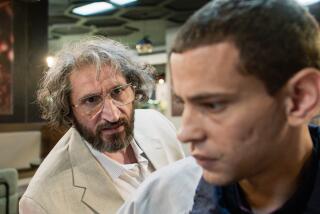Book Marks: ‘Istanbul Passage’ follows postwar maneuvers
- Share via
In the aftermath of World War II, Istanbul’s politics, like its geography, stood delicately balanced between East and West. So, too, does Leon Bauer, an American tobacco executive, in Joseph Kanon’s moody postwar thriller “Istanbul Passage” (Atria: 406 pp., $26). Leon is married to Anna, a German Jew who had smuggled European Jews through Istanbul to freedom in Palestine during the war. She suffered a nervous breakdown that left her institutionalized and Leon devoted but emotionally adrift.
Unable to serve in the military, Leon had done his bit by taking unofficial courier jobs and trading in scarce metals for Tommy King, an American consulate employee working on war-related economic issues. When Leon agrees to help Tommy transport Alexei Jianu, a mysterious Romanian passenger, through Istanbul to waiting State Department officials in Cyprus, things go south quickly. Leon finds his predictable, if stultifying, existence threatened by what happens.
A threat of another kind is also posed by Leon’s sudden affair with an embassy official’s wife visiting from Ankara. As the body count rises, so do the risks, making Leon wonder: “What do you do … when there’s no right thing to do? Just the wrong thing. Either way.” Watching Leon maneuver himself and Jianu to the surprising answer to that question — while dodging traps set by the Istanbul police, Turkish state security and Russian agents — is one of the chief pleasures of “Istanbul Passage.”
Moreover, Kanon — best known for “The Good German” and the Edgar Award-winning “Los Alamos” — so thoroughly immerses the reader in the history, beauty and complexity of Istanbul that you can practically feel yourself moving through the tile-cooled mosques and twisted streets, smell the leather bags in the Bazaar, see “the open mouth of the Bosphorus, alive with boats.”
—Paula Woods
More to Read
The biggest entertainment stories
Get our big stories about Hollywood, film, television, music, arts, culture and more right in your inbox as soon as they publish.
You may occasionally receive promotional content from the Los Angeles Times.










